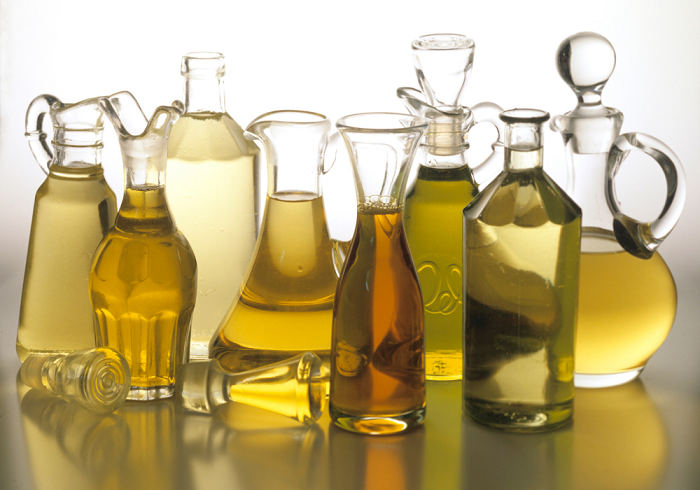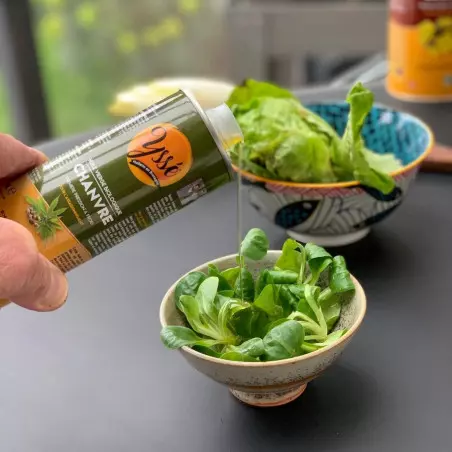The recycling of cooking oils is an increasingly widespread practice around the world, as it helps reduce waste and protect the environment. Used oil has a significant impact on our environment; it is responsible for clogging sewer pipes and polluting groundwater. It is natural to think that disposing of our oils not only harms our environment but also our wallets, given the recent price increases. Therefore, it has become necessary to recycle our cooking oils to preserve wildlife and flora and save money !
In this article, we will explore why it has become so important to recycle cooking oils and the correct method for recycling oil.
What are the different types of cooking oils ?
There is a wide variety of cooking oils used in the kitchen, each with its own characteristics and nutritional properties. Here are a few examples:
Olive oil: As its name suggests (and this is the case for most oils), it is extracted from olives and is very rich in antioxidants and monounsaturated fatty acids, with omega-9 making up about 80% of its composition. It is considered the best cooking oil because it contains a lot of healthy fats. You can use it in salads, marinades, and for medium-heat cooking.
Sunflower oil: Extracted from sunflower seeds and very rich in polyunsaturated fatty acids, it is characterized by its fluidity and lightness. Its high vitamin E content has a beneficial effect on neuromuscular activity and the skin. It is often used as a cooking oil, suitable for high-temperature cooking and in pastries for its neutral taste.
Linseed oil:linseed oil is extracted from flax seeds, which contain about 70% polyunsaturated fatty acids from the omega-3 family. It is often used for its health benefits, particularly to reduce the risk of cardiovascular diseases, inflammation, and certain types of cancer. Thelinseed oil is very sensitive to oxidation, it should not be heated. It is important to keep it cold to preserve its freshness and health benefits.
Rapeseed oil: It is extracted from rapeseed and is considered very good for health due to its richness in omega-3 fatty acids. Because of its properties, it helps regulate cholesterol levels in the blood and inhibit inflammation. You can use it for high-temperature cooking and in sauces and dressings.
Coconut oil: this oil is extracted from the pulp of coconut and is rich in saturated fatty acids. It is often used for raw and vegan cooking and in desserts, as it becomes solid at room temperature, as well as for food preservation because it is highly resistant to rancidity.
Hemp oil: extracted from the seeds of the hemp plant, hemp oil contains more than 80% essential fatty acids. It has a nutty taste and a slightly thick texture. It is best to use thehemp oil Raw because cooking changes the structure of its fatty acids.
Why recycle cooking oils ?
The recycling of cooking oils is increasingly important for several reasons, but the number one reason is the ENVIRONMENT! We must think about the future of our planet because in case of damage, we will be the only losers and our children even more so! "We do not inherit the earth from our ancestors, we borrow it from our children." Antoine de Saint-Exupéry. It is necessary to preserve nature and the environment to ensure a better future for our children. Recycling cooking oils has become essential because these oils have a strong impact on the environment : they (feminine) pollute the groundwater "and" harm the wildlife and plants which will cause soil and watercourse pollution and disrupt the aquatic ecosystem. By recycling used oils, we can reduce food waste and protect the environment..
Furthermore, the recycling of cooking oils can be Economically advantageous. Recycled oils can be used as biofuel, which can help reduce dependence on fossil fuels and thus lower energy costs. It can also save on waste disposal costs.
Finally, the recycling of cooking oils can be beneficial for public health. Indeed, used cooking oils can be dangerous to human health if they are improperly disposed of or misused. Pollution of watercourses or groundwater can lead to the proliferation of harmful microorganisms, which subsequently causes the emergence of various diseases. By recycling these oils, we can prevent their misuse or improper disposal and thus mitigate health risks.

How does the recycling of cooking oils work ?
The recycling of cooking oils involves several steps to transform them into useful products. First, used cooking oils must be collected in special household waste containers or treated hazardous waste containers, in restaurants, supermarkets, or homes. The recovery of the oils is carried out by used oil collectors who transport them to treatment centers. These oils must then be filtered to remove impurities, such as food residues, debris, or water. This step can be done manually or with special industrial equipment. Finally, the filtered oils are treated to eliminate contaminants, such as free fatty acids, water residues, and odors. Treatments may include neutralization, clarification, and deodorization. These recycled oils can then be reused for various purposes.
You can recycle your oils at home, for example: Reuse for cooking: If cooking oil has been used for food (for example, fries in frying oil), you can filter it and reuse it for cooking other similar foods. Soap making: Used cooking oils, such as olive oil or coconut oil, can be used to make homemade soap. Lubricants and wood products: Old oil can be used as a natural lubricant for small mechanisms or as a wood maintenance product. For example, you can use linseed oil to lubricate hinges or to nourish and protect wooden furniture. Skincare products: Some cooking oils, such as sweet almond oil or coconut oil, can be used to make products for skincare homemade. They can be used as ingredients for lotions, lip balms, or hair products.

How to add value to frying oils ?
The valorization of frying oils aims to prevent environmental pollution. Giving a second life to these used oils can be done in several ways:
Biodiesel production: Used frying oil can be transformed into biodiesel. After filtering and removing impurities from the used oils, components such as methanol or sodium hydroxide are added to enable the separation of fats. Finally, just 5% diesel needs to be added to obtain a biofuel.
Soap making: Used frying oils can be used to make soap, which can be used at home or sold at markets.
Production of industrial lubricants: The production of lubricants is feasible with used frying oils; they can then be used in industrial machines.
Use as biofuel: Used frying oils can be used as biofuel for boilers that heat buildings.
Who collects cooking oils ?
The collection of cooking oils can be carried out by different stakeholders, depending on the context and the regulations in place:
- Private collectors:There are private companies specialized in the collection and processing of used cooking oils. These companies can work with restaurants, supermarkets, schools, hospitals, or households to collect the used oils.
- Public collectors:In some cases, the collection of used cooking oils can be carried out by public authorities, such as municipalities or regions. These collectors may provide special containers for the collection of used oils.
- Associations or cooperatives:There are also associations or cooperatives that collect used cooking oils to recycle them locally. These initiatives can be supported by local authorities or non-profit organizations.
Conclusion:
The recycling of cooking oils has become necessary to preserve the environment, health, and the economy. At home, "expired" oils can still be used for many purposes, which limits food waste and saves you from buying other products that oil can replace. Large-scale recycling must follow several steps to reuse these oils for purposes such as: biodiesel production, soap or industrial lubricant manufacturing, or even as fuel for boilers. It is important to note that the collection of used cooking oils must be carried out in accordance with current regulations to ensure safe and efficient collection. Collectors must be trained to handle used oils safely and avoid any risks to health and the environment.










